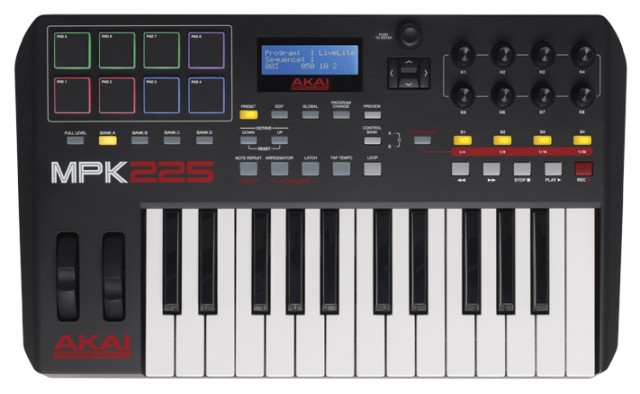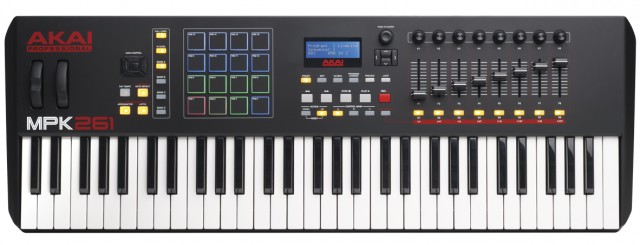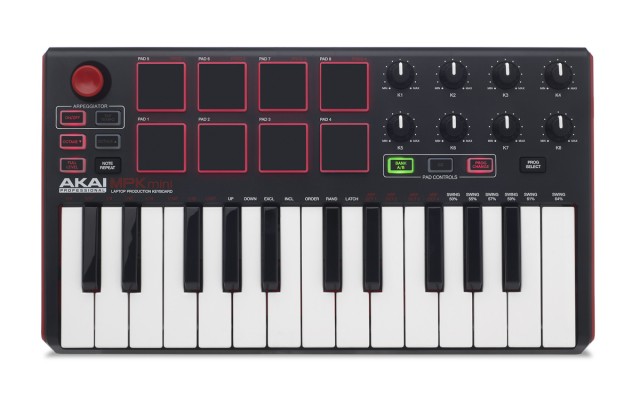
Akai Professional is now shipping four new MPK keyboard MIDI Controllers:
- The 25 key MPK225 (above)
- the 49 key MPK249
- the 61 key MPK261, and
- the ultraportable MPK mini mkII.
According to Akai Professional Product Manager Dan Gill, “The new MPK series is huge leap forward–improving on the previous series, with more capability, more features, and industry leading software.”
Here are the details:

Key Features:
- Four -line backlit LCD screen
- Deep software integration
- Send QWERTY style commands from the full-size MPK keyboards
- Illuminated, velocity-sensitive RGB trigger pads, with Note Repeat, MPC Swing, Full Level and 16 Levels.
- Each full-size MPK keyboard provides a semi-weighted keybed with aftertouch, plus Pitch Bend and Modulation wheels.
- Dedicated Octave buttons provide rapid access to an expanded note range.
- Assignable pedal inputs for additional control.
- USB MIDI + traditional 5-pin MIDI inputs and outputs
- A low-power mode is ideal for use with iOS devices, via the Apple iPad Camera Connection Kit.
For mobile use, Akai offers the MPK mini mkII.
The compact form factor features 25 synth-action minikeys, plus a new dual-axis thumbstick for expressive control.
There are eight backlit MPCstyle velocitysensitive pads, and eight assignable knobs for hands on beat production and parameter control. A single USB cable brings power to the MPK mini mkII, and creates a two-way data link with any computer.
MPK mini mkII includes Note Repeat, Octave extension buttons, an arpeggiator, and fullsize USB and sustain pedal inputs.
Each keyboard comes with these apps:
- Akai Professional’s MPC Essentials beat production software;
- Ableton Live Lite composition/performance software; and
- Hybrid 3 analog modeled synthesizer virtual instrument.
Fullsize models include Twist 2.1 from SONiVOX, a spectral morphing synthesizer. The MPK261 also includes EightyEight Ensemble, a piano instrument.
MPK mini mkII also ships with Wobble 2.1, an EDM-centric synth.

MPK Series Details:
- MPK225
- 25 semiweighted keys with aftertouch
- 8 RGB pads; 4 banks
- 8 knobs; 4 assignable buttons
- 1 footswitch jack; 1 expression pedal input
- $249.99 USD
- MPK249
- 49 semiweighted keys with aftertouch
- 16 RGB pads; 4 banks
- 8 knobs; 8 assignable buttons, 8 faders
- 1 footswitch jack; 1 expression pedal input
- $399.99 USD
- MPK261
- 61 semiweighted keys with aftertouch
- 16 RGB pads; 4 banks
- 8 knobs; 8 assignable buttons, 8 faders
- 2 footswitch jacks; 1 expression pedal input
- $499.99 USD
- MPK mini mkII
- 25 synth-action mini keys
- 8 illuminated pads
- 8 assignable knobs
- 1 assignable footswitch jack
- $99.99 USD
See the Akai Pro site for details.

nice ….but too expensive, at least for my budget
You Could Spend $400…. Or You Could Buy A 6 Yr Old Axiom 25 With The Same Features For $150. I Like Akai, But I Swear They Just Releasing Stuff With Light Up Drum Pads And They Call It New. I Guess The Color RespondiG To A Certain Sample Cell Is HelpfulCom. Maybe There Is More To It I Don’ See, Like An Arp. idk
Do You Have To Capitalize Every Word In A Sentence Like It’s The Title Of A Thesis?
Yes I agree it looks ridiculous, my phone types weird on its browser.
anyway, this is probably very solid feeling for the price and brand, but for home studio the MPK225 doesn’t compel me. Maybe if I used Live or mobile music apps I would think differently.
They aren’t competing with what people were doing 6 years ago, though, they’ve got to be competitive with other company’s current gear. Nowadays, a lot more keyboardists are using Live, using mobile devices, doing beatmaking ‘in the box’ and so on, so having a keyboard controller tailored to that makes a lot of sense.
For people that just want to play piano sounds with a keyboard controller, though, this obviously isn’t tailored to them.
the mini is nice though – I use an mpk mini right now and love it – the addition of the joystick though I am all about
This Is So Cool, I Am Going To Type Like This From Now On….. Whoo Whooopp.
The action on the 225, 249, and 261 has been greatly improved. No more overly stiff keys.
i have mpk225 at home like for two months.. is it a news?
If the build is tough and the keyboard actually feels more like an instrument, I’d commit to one of these. Its more of a good central controller because of the MIDI means and expression pedal jacks, often notably missing on some popular devices. The prices may seem a bit dear, but if you really wring them out, its worth it for the dependability. Buying Up a notch is rarely a bad idea. Its still less than most hardware synths, so if you are at least half-softsynth or more like many of us, pro-rating for several years of use makes it look a lot more appealing. Its a pretty well-balanced package.
No lit up pitch and mod wheels? Epic fail…
MPK mini mkII and the new joystick works nicely with iPad Air especially with the new MIDI updates to KORG Gadget. Unlike the original MPK mini you’ll get a power consumption warning but that can be overridden by using a small non powered USB travel hub in the middle of your cabling to the CCK. No issues with mine, use it all the time for the last month.
I was deeply disappointed to find out that I had to use a usb hub to fool my iPad into working with the mini mk2. I hope there is some way akai can fix this with a firmware update or something, especially considering the original mini worked in low power mode just fine.
It is the best looking of the bunch though. Probably gonna keep it regardless.
yay finally! i’ve been using the original since 2009. the drum pads on it were an epic fail, more like squishy buttons, so i disabled them and stuck a quneo on top with some velcro. will definitely upgrade if i don’t have do smash on the pads!
The pads are still not good. But the keys are much better.
You’ll have to wait for the MkIII version to get the MPC pads on these things.
The only thing that keeps me away from these is the fuglyness, lights and decal, yuk!